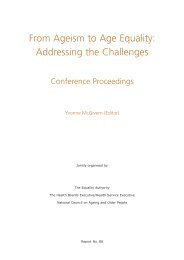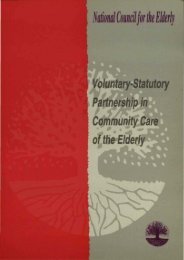Assessment of Older People's Health and Social Care Needs and ...
Assessment of Older People's Health and Social Care Needs and ...
Assessment of Older People's Health and Social Care Needs and ...
- No tags were found...
You also want an ePaper? Increase the reach of your titles
YUMPU automatically turns print PDFs into web optimized ePapers that Google loves.
<strong>Assessment</strong> DomainsThe assessment domains will cover the following:• users' perspective• clinical background• disease prevention• personal care <strong>and</strong> physical well-being• senses• mental health• relationships <strong>and</strong> involvement• safety• immediate environment <strong>and</strong> resources.Critical IssuesThe critical issues that we have to address in developing an assessment approach are as follows:• how do we define a need? For example, do we define needs in terms <strong>of</strong> ability or/<strong>and</strong> disability?• is expectation synonymous with age? In other words, is it acceptable to have decreasingexpectations <strong>of</strong> mobility for an 85 year old person than a 65 year old?• how will we respond to people who need more or less personal attention? For example, are wesaying that if you need a lot <strong>of</strong> personal care, you have a greater need than an older person livingalone but able to get around <strong>and</strong> manage many <strong>of</strong> the activities <strong>of</strong> daily living but who is sociallyisolated <strong>and</strong> lonely.• where resource deficits impact on the quality <strong>of</strong> life, how will we measure this?• is our Intervention responsive <strong>and</strong> are needs met or unmet as a consequence <strong>of</strong> it?_f----------------------------------Getting ThereIn the NEHB, we have a number <strong>of</strong> different assessment tools in use in various settings. We arecurrently evaluating those as a prelude to developing a st<strong>and</strong>ardised approach. We also need toidentify <strong>and</strong> develop the concept <strong>of</strong> key worker with overall responsibility for ensuring the completion<strong>of</strong> assessment <strong>and</strong> the mobilisation <strong>of</strong> an appropriate service response. Central to the success cif thisapproach is the development <strong>of</strong> appropriate <strong>and</strong> integrated care pathways, monitoring <strong>and</strong>evaluation criteria, referral <strong>and</strong> care protocols. Finally, our belief is that a commitment to ongoingchange management must underpin the process <strong>of</strong> developing a st<strong>and</strong>ardised approach toassessment. In the absence <strong>of</strong> that commitment, the process will flounder.Conference Proceedings















